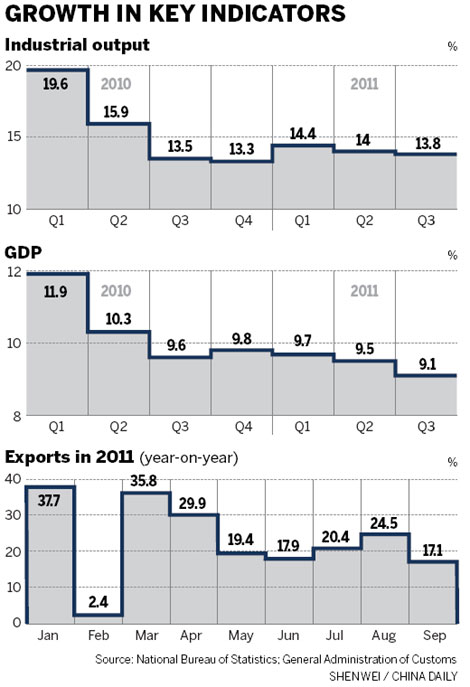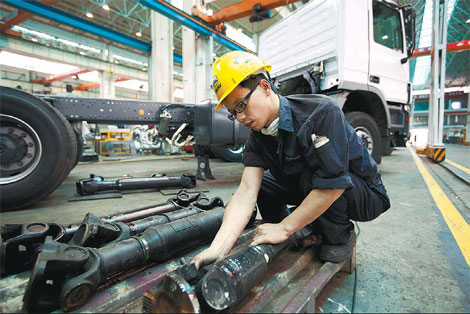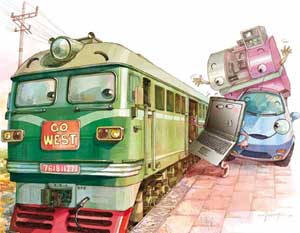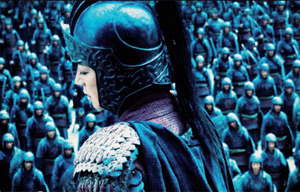Industrial growth seen continuing to weaken
Updated: 2011-10-27 07:50
By Wei Tian and Chen Limin (China Daily)
|
|||||||||
|
A worker handling truck drive-train components at a factory in Changsha, Hunan province. China's industrial output is likely to expand about 11 percent next year, according to the Ministry of Industry and Information Technology. Forbes Conrad / Bloomberg |
Global turmoil, structural change will result in a downtrend over coming months
BEIJING - China's industrial growth will continue to slow in the coming months and in 2012.
That's because of weakening economic forces, both domestically and overseas, according to an official from the Ministry of Industry and Information Technology on Wednesday.
China is likely to see industrial output grow by around 11 percent next year, in line with a slowing trend from the fourth quarter onwards, Xiao Chunquan, an official at the ministry, told a news briefing.
So far, growth has been decreasing on a year-on-year basis, from 14.4 percent in the first quarter, to 13.8 percent in the third. The figure rebounded slightly to 13.8 percent in September from 13.5 percent in August.
"With the continuing uncertainties over global economic turmoil and domestic inflation, and increasing efforts in the reduction of emissions and the optimization of the economic structure, growth will keep falling in the coming months," Xiao said.
Chinese factories are struggling to cope with rising operating costs, fuelled by a stronger yuan. Meanwhile funding difficulties are putting more pressure on small enterprises, the ministry said in a statement.
Song Guoqing, a professor at the China Center for Economic Research at Peking University, said slowing industrial growth signals weak economic growth, as industrial output contributes about half of China's total GDP.
Song said industrial growth of 11 percent for the next year was a "pessimistic prediction", but the trend of decline is unquestionable.
"The central government should consider relaxing the tight monetary policy that it has followed since the beginning of the year, considering that prices are already falling," Song said.
Data from the National Bureau of Statistics showed China's annual inflation dipped to 6.1 percent in September, retreating further from an almost three-year high of 6.5 percent in July.
Meanwhile, GDP growth slipped to 9.1 percent in the third quarter from 9.5 percent in the second and 9.7 percent in the first.
On Tuesday, Premier Wen Jiabao reiterated the message that fighting inflation is China's top priority, but said the country should maintain reasonable credit growth and improve levels of financing for business.
A big part of the domestic demand driven by fixed-asset investment is weakening as the effects of the country's 4 trillion yuan ($629 billion) stimulus package in 2008 are fading, Xiao said.
"The driving forces of China's economic growth are shifting from policy stimulation to internal forces, which suggests that the macro-control policies have played their part," Xiao said, emphasizing that export value growth was 11 percentage points lower than that of sales growth in the first three quarters.
China's biggest e-commerce website, Alibaba.com Ltd, where businesses trade with each other, said overseas procurement activity has been affected by the economic crises in Europe and the United States, and the purchasing enthusiasm of overseas buyers has diminished.
In a report on Tuesday, Alibaba.com said that the outlook for Chinese exports to Australia, Brazil, and North America will be better than for other destinations, based on trade data provided by sellers and buyers.
The report cited Lideng Lighting Factory Co - a lamp maker in Guangdong province, one of the country's export bases. The company said its exports to Europe have fallen sharply this year, but orders from emerging markets, such as Brazil, have doubled.
In a research document, Li Daokui, director of the Center for China in the World Economy at Tsinghua University in Beijing, said that the slowdown was an inevitable trend, and the key point is to move from the old development pattern, one that is highly dependent on overseas demand and a high investment rate.
"We should still be confident in the potential of China's economic growth, which is guaranteed by the process of urbanization and deepening economic reform," Li said.
But the slowdown will have a bottom line, and policymakers should follow the global trend closely to formulate appropriate policies, such as the introduction of large projects like further construction of public housing, to avoid a hard landing for the world's second-largest economy, he said.
China Daily

(China Daily 10/27/2011 page13)












